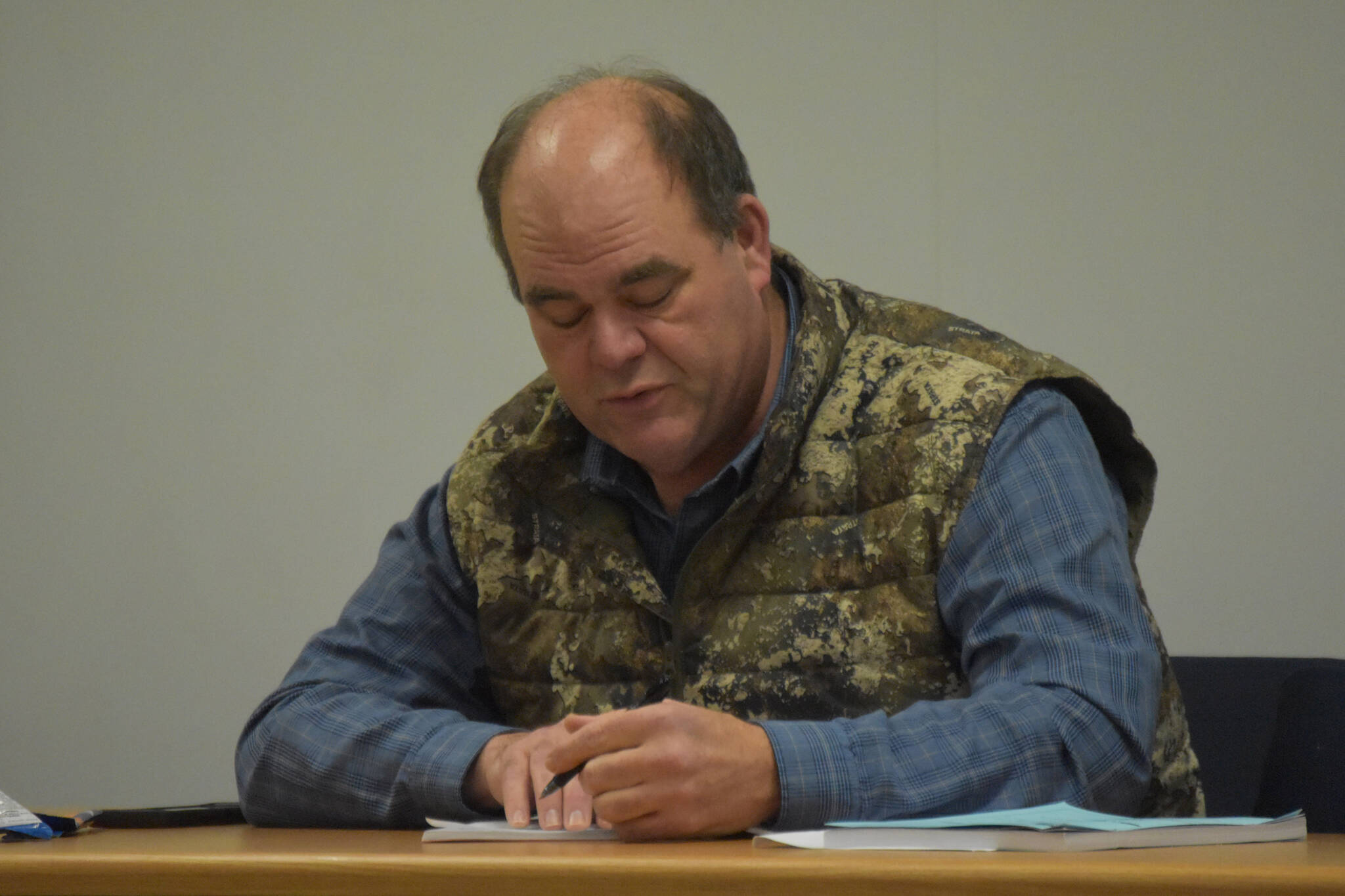At a public meeting of the Kenai/Soldotna Fish and Game Advisory Committee on Monday at the Cook Inlet Aquaculture Association, 12 representatives discussed and voted to determine the committee’s official recommendation on 26 proposals to the Board of Game, ahead of the board’s March 3 meeting.
Proposals discussed Monday included those related to hunting ducks, sheep, goats, moose and ptarmigan on the Kenai Peninsula.
To provide context relating to population and ecological concerns, the committee was joined by three representatives of the Department of Fish and Game: Area Biologist Nick Fowler, who was present in the room, as well as Waterfowl Program Coordinator Jason Schamber and Small Game Biologist Rick Merizon, who both joined via Zoom.
Of the 26 proposals considered, the committee approved three — one only after amendment.
Proposal 116 would create a regulation banning any hunter in Unit 15C, near Kachemak Bay, who harvests a nanny — a female goat — from participating in goat hunts for a five-year period. The group unanimously agreed to recommend the proposal, which would make the regulation uniform across the peninsula.
Proposal 163, which would rescind specific bag and possession limits for certain species in Unit 15C, was also approved unanimously. The group elected to support the proposal because Schamber said the department is seeing steady populations and has “no biological concerns relative to harvest,” and to simplify regulations by bringing the area in line with the rest of the state.
Proposal 105, as written, would limit hunters to one big game registration at a time in Units 7 and 15, which cover the Kenai Peninsula. Holding one hunting permit would make a user ineligible to receive others. The purpose would be to stop people from losing out on a limited registration in the scenario where one hunter would scoop up multiple registrations without even the possibility of participating in each.
After discussion, the group unanimously voted to write an amendment to the proposal, which they passed unanimously. “One registration permit, per species, at a time,” the proposed amendment said. This would, they said, prevent conflict between holding a sheep permit and then later hunting a goat, but would stop a single hunter from holding multiple tags for one animal and denying others opportunity.
Two proposals were discussed and ultimately tabled to afford the public a chance to testify at the committee’s next meeting on Feb. 6. These were Proposals 106 and 107, both of which concern allowing ATV use in parts of Unit 15C, for a proposed reasoning of increasing access for disabled veterans, with two separate methods.
A variety of proposals related to ducks were rejected. These include 171, which would direct the department to add a new sea duck survey; 172, which was a close match for 171; and Proposals 164-170, which each proposed a reduced bag limit for a specific species of ducks.
The large group of proposals related to duck species, 164-170, were all rejected because Schamber said ADF&G has no biological concern for the populations. The committee was also generally against adding any species specific regulations because it would become overcomplicated, especially in early parts of the season when many of the birds look alike, they said.
Next discussed was Proposal 162, concerning ptarmigan, which would extend that season by three months in part of 15C. Merizon said the current length and limit for the birds in that area was implemented as a result of low breeding densities in 2014. The population has since rebounded, and the department no longer has conservation concerns. He said the proposal would ultimately be a matter of what seasons the hunters want — short seasons with lots of birds, or long seasons with fewer birds. The proposal split the body, coming in at 6 in favor and 6 opposed, resulting in the proposal failing.
The group voted against Proposal 81, which would require breakaway mechanisms on traps placed near Kodiak roads. Chair Mike Crawford explained that breakaways, which are designed to help non-target species escape traps, require an amount of force to use. They are used successfully on the Kenai Wildlife Refuge to protect moose and caribou. The non-target species the proposal seeks to protect are deer.
“A breakaway is not, in my opinion, going to help a deer,” Crawford said.
Proposals 108 through 113 all related to sheep hunting, and all were rejected either unanimously or with one abstention or in opposition. These proposed opening archery-only hunts, closing sheep hunting entirely, and making all sheep hunts registration hunts.
The group also voted against proposals related to goat hunting, 114 and 115, which would add an archery-only hunt for goats and split all goat hunts in 15C into two seasons, respectively.
The body took no action on 117, which was an exact match for 116, which had been approved.
The final proposal discussed was 118, which would return certain moose, including those with spike-fork antlers, to legal status. The group unanimously rejected the proposal because the moose population is seen both in data and anecdotally to be increasing and expanding. The group was opposed to returning spike-fork antlers to legal status and risk reducing the population again.
“It’s working,” Monte Roberts said of the current regulations. “Leave it alone for three years at least.”
Monday’s meeting follows another held Jan. 9, in which 15 proposals to the Board of Game were considered. Two more meetings are scheduled for Feb. 6 and Feb. 16 to wrap up the committee’s stance on the remaining proposals to the Board of Game and the Board of Fish.
Proposals to the boards are considered for each region of Alaska on a three-year cycle. The Southcentral region will have proposals considered this year, then not again until 2026. Advisory committees make their official recommendations known to the board ahead of those sessions.
For more information about Fish and Game Advisory Councils, or to view all proposals to the Boards of Fish and Game, visit adfg.alaska.gov.
Reach reporter Jake Dye at jacob.dye@peninsulaclarion.com.

